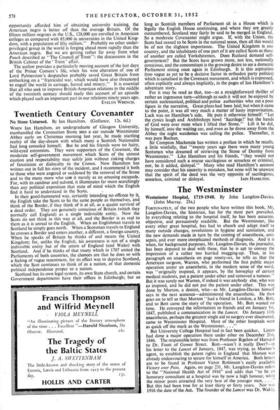Twentieth Century Covenanter
No Stone Unturned. By Ian Hamilton. (Gollancz. 12s. 6d.) WHEN Ian Hamilton, an undergraduate of Glasgow University, manhandled the Coronation Stone into a car outside Westminster Abbey early on Christmas morning last year, he made startling reality of the day-dream with which many a Scottish Nationalist had long consoled himself. But he and his friends were no hairy, wild-eyed extremists. They were supporters of the Covenant, the moderate self-government movement which Scots of the utmost caution and respectability may safely join without risking charges of fanaticism or disloyalty to the Crown. Now Hamilton has written out in full his story of the incident, and I recommend it both to those who were angered or saddened by the removal of the Stone and to the many more who saw it merely as an amusing escapade. For, with its candour and naïveté, it illuminates far more searchingly than any political exposition that state of mind which the English find it hard to understand in the Scots.
In their good-humoured way, certainly intending no offence by it, the English take the Scots to be the same people as themselves, and think of the Border, if they think of it at all, as a quaint survival of a dead order. They are genuinely conscious of Britain (which they normally call England) as a single indivisible entity. Now the Scots do not think in this way at all, and the Border is as real to them as it is unreal to the English. When an Englishman travels to Scotland he simply goes north. When a Scotsman travels to England he crosses a Border and enters another, a different, a foreign country. When he speaks of Britain he thinks of and means the United Kingdom; for, unlike the English, his awareness is not of a single indivisible entity but of the union of England (and Wales) with Scotland. And if he thinks of that treaty which in 1707 united the Parliaments of both countries, the chances are that he does so with a feeling of vague resentment, for its effect was to deprive Scotland, which the Scot continues to think of as a nation, of that domestic political independence proper to a nation. Scotland has its own legal system, its own State church, and certain Government departments have their offices in Edinburgh; but so long as Scottish members of Parliament sit in a House which is lbgally the English House continuing, and where they are greatly outnumbered, Scotland may fairly be said to be merged in England. So a moderate Covenanter might argue. If, with the Union, the Scots had ceased to be Scots in the national sense, then all this would be of not the slightest importance. The United Kingdom is one country, and the inhabitants of one part of it are called Scots as those of another are called Yorkshiremen. Does Rutland demand self- government? But the Scots have grown more, not less, nationally conscious, and the concomitant is the growing desire to see a domestic Parliament sitting once again in Edinburgh. It is this aspiration (too vague as yet to be a decisive factor in orthodox party politics) which is canalised in the Covenant movement, and which is expressed, often explicitly and always implicitly, in the pages of Ian Hamilton's adventure story.
For it may be read as that, too—as a straightforward thriller of rather an ingenuous turn—although as such it will not be enjoyed by certain ecclesiastical, political and police authorities who cut a poor figure in the narrative. Great plans had been laid; but when it came to the point, it was all very much a matter of hasty improvisation. Luck was on Hamilton's side. He puts it otherwise himself: "Let the cynics laugh and Archbishops howl 'Sacrilege!' but the hands of God were over mine when I lifted that Stone." Lift it he did, by himself, into the waitins car, and even as he drove away from the Abbey the night watchnian was calling the 'police. Thereafter, it was pure Buchan.
Sir Compton Mackenzie has written a preface in which he recalls, a little wistfully, that "twenty years ago there were many young Scotsmen who dreamed of retrieving the Stone of Destiny from Westminster." Like Hamilton and his friends, "they would not have considered such a- rescue sacrilegious or senseless or criminal, nor, be it added, disloyal." Many who read Hamilton's account may consider that his sincerity is mistaken, but none will be unaware that the spirit of the deed was the very opposite of sacrilegious,


































 Previous page
Previous page